Community
Decades of Doing Good at Annandale Village Celebrated with Golf Fundraiser
Published
7 months agoon
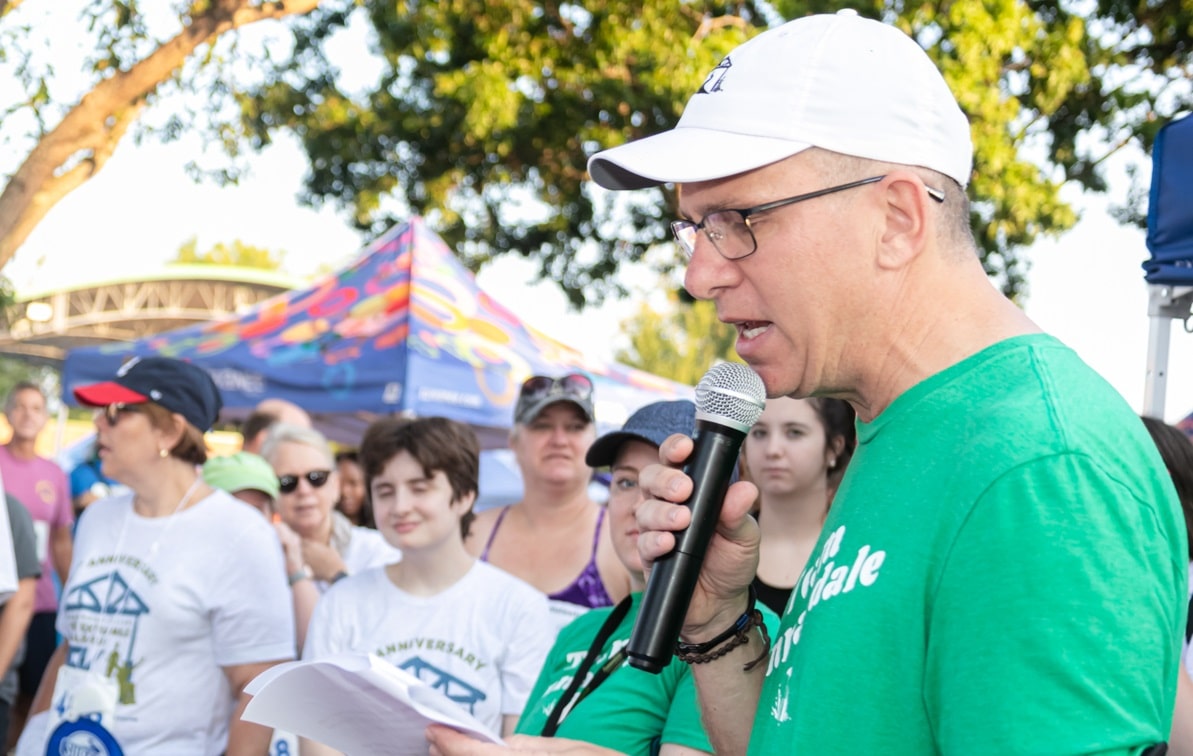
Peachtree Corners resident Adam Pomeranz will celebrate 20 years at a place of hope where hundreds of adults are served each day. That place is Annandale Village, a residential community for adults with developmental disabilities or brain injury. At least, that’s how it began.
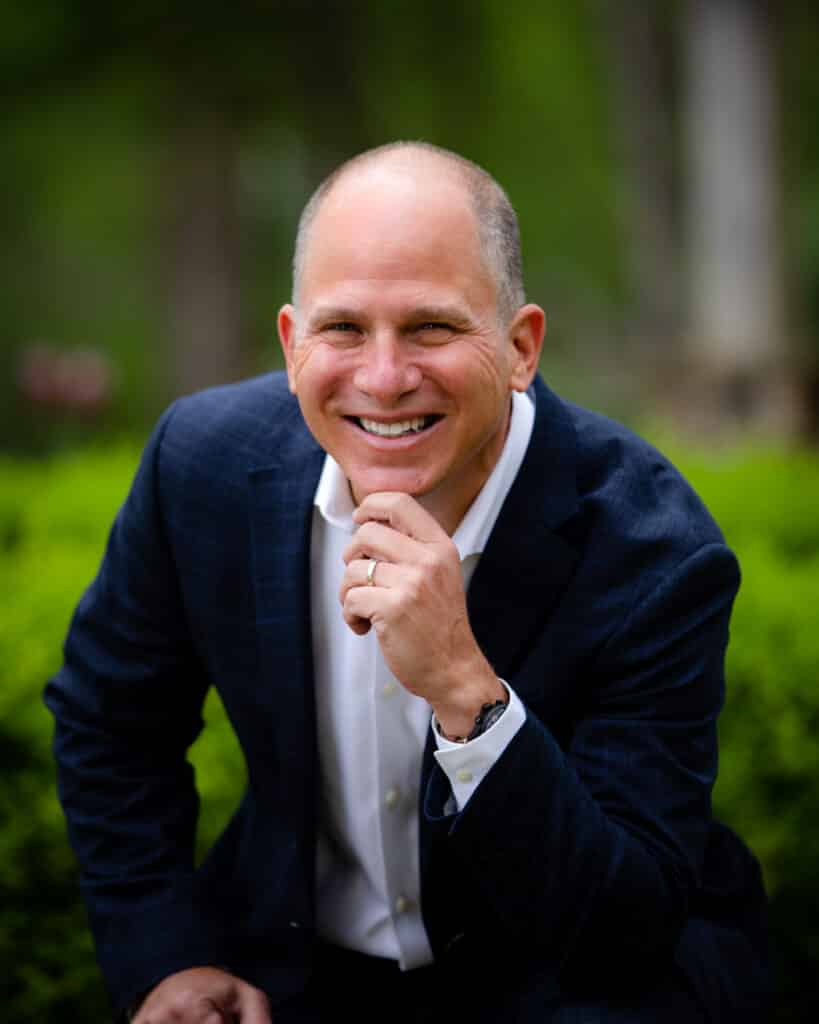
Today, it’s not solely a residential community because it now serves people who don’t live on the campus in Suwanee. A newer, smaller program now offers options for a wide range of needs.
Annandale Village began in 1969 as the dream of Dr. and Mrs. Maxwell Berry, parents of a young woman with developmental disabilities.
“They did not like the very limited options that they saw in the country and the local community and beyond for their daughter,” he said. “She was entering adulthood, so after seeing a similar model, but not the exact model, on a vacation to Europe, they decided to try and do something on their own here.”
Annandale’s mission
The 55-acre campus in Suwanee serves individuals in the facility and outside of it.

“One of the things that truly differentiated Annandale was that, a little over 20 years ago, it decided to embrace a new phenomenon in the world of working with people with intellectual disabilities: the aging person with developmental disabilities,” said Pomeranz.
For many years, people with developmental disabilities had shorter life spans than folks without those challenges for many reasons. Now, advances in medicine and other factors help people with developmental disabilities live much longer lives, some very close to the lifespan of people without disabilities, said Pomeranz.
“Shortly before I came, Annandale decided to embrace that aspect of the population. And we opened up a 16-bed skilled nursing facility solely for that population to complement the cottages and apartments that we had spread out through the campus at the time, said Pomeranz. “And so, the nursing home filled up very quickly and it became apparent that this was a huge need.”
Expanding services
Over the next several years, Annandale opened an assisted living building and also expanded the nursing home. Although the facility is aimed at ages 18 and up, some are younger and some are considerably older.
“The idea is that Annandale provides progressive life assistance. As the individual’s needs change, the services we offer can change with them. So someone could come to Annandale at 22 or 23 years old and conceivably live here the rest of their lives, and we can meet their needs as they change throughout that adult lifespan.”
A few years ago, Annandale added and new service to its continuum of care.

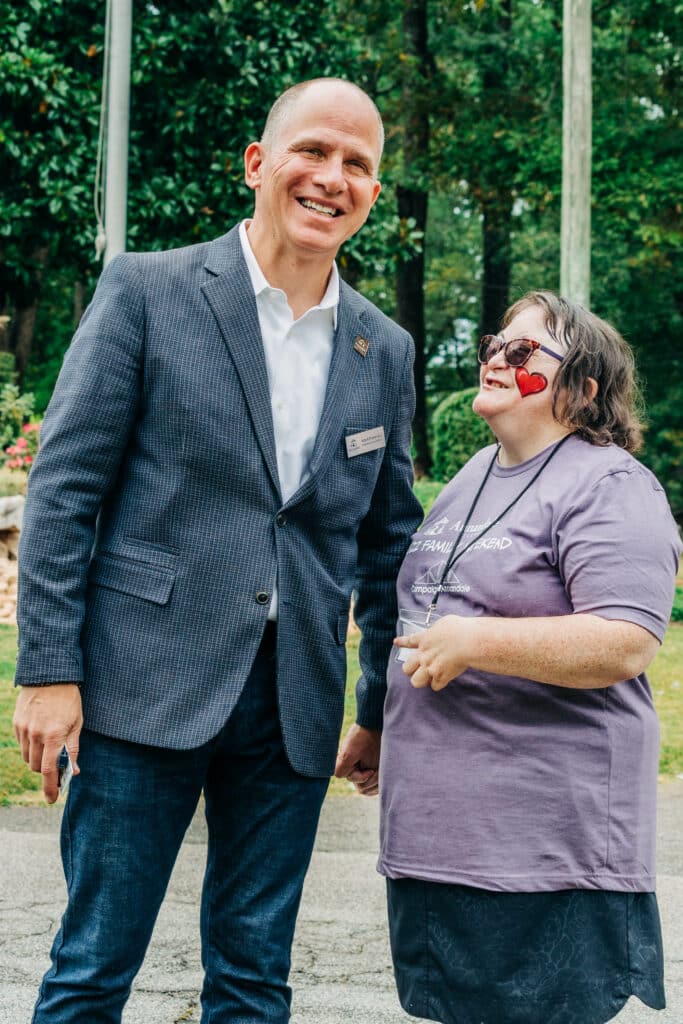
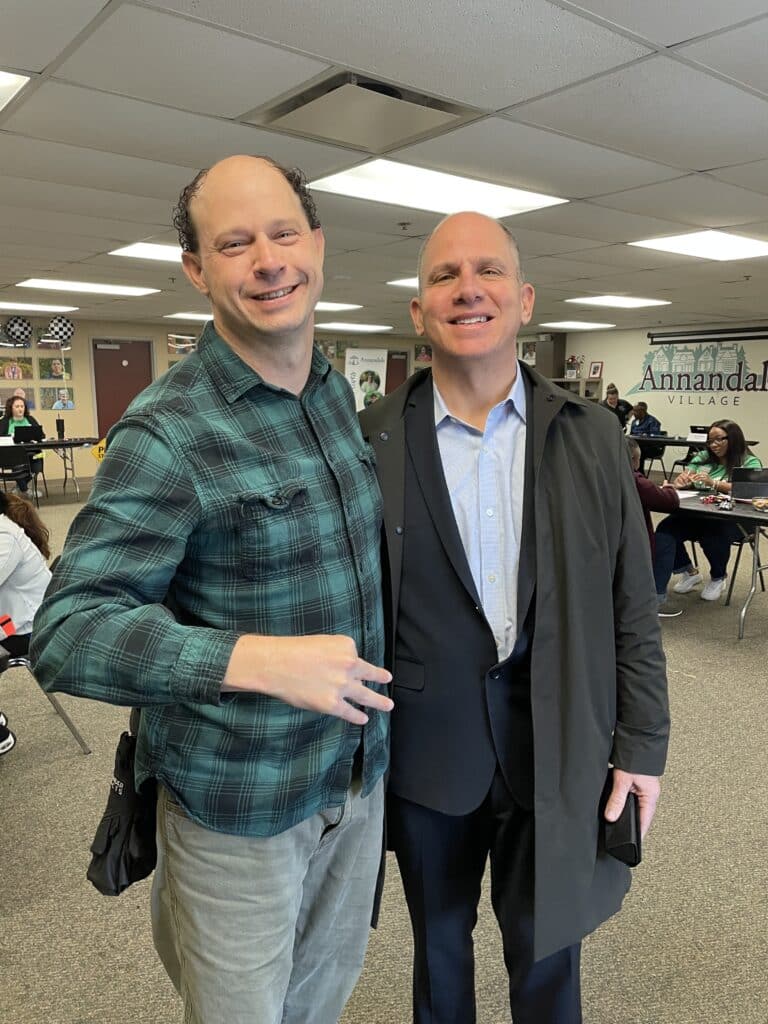
“On occasion, some folks gain skills when they’re here and then leave to be more independent elsewhere, either in our independent living program or some other option,” said Pomeranz.
The All In program has about 16 people who need about 10 to 12 hours of support a week. They live in apartments in Suwanee or other parts of metro Atlanta. They’re required to work or volunteer to be eligible for the program.
Keeping Annandale affordable
Annandale’s founders wanted an affordable private pay model. Their philosophy was to charge families about 75% of what it costs to care for their loved ones, and the philanthropic community would take care of the other 25%.
With rising health care costs, that 25% is getting harder to come by, but Pomeranz and his staff are making it work.
“Now, almost 55 years later, when you look at our bottom line at the end of the year, you will see that about 75% of our revenue is fee-for-service revenue, and about 25% is philanthropy,” he said.
“At the same time, we are still mostly a private-pay organization, and it’s become very expensive to provide the care. But we have wait lists, so clearly there’s a market for what we do,” he explained.
Annandale does take Medicare and Medicaid in the nursing home. It also has a relatively small day program for which it takes Medicaid waiver funds. But everything is supplemented with fundraising.
Annandale’s fourth annual golf tournament
Before COVID, Annandale threw charity events with dinner and dancing like many other nonprofits. For about 26 years, the annual fundraiser was called The Jazzy Thing, which then became shortened to Jazzy. It took place on the last weekend of April. In March 2020, the pandemic struck, and everything was canceled.
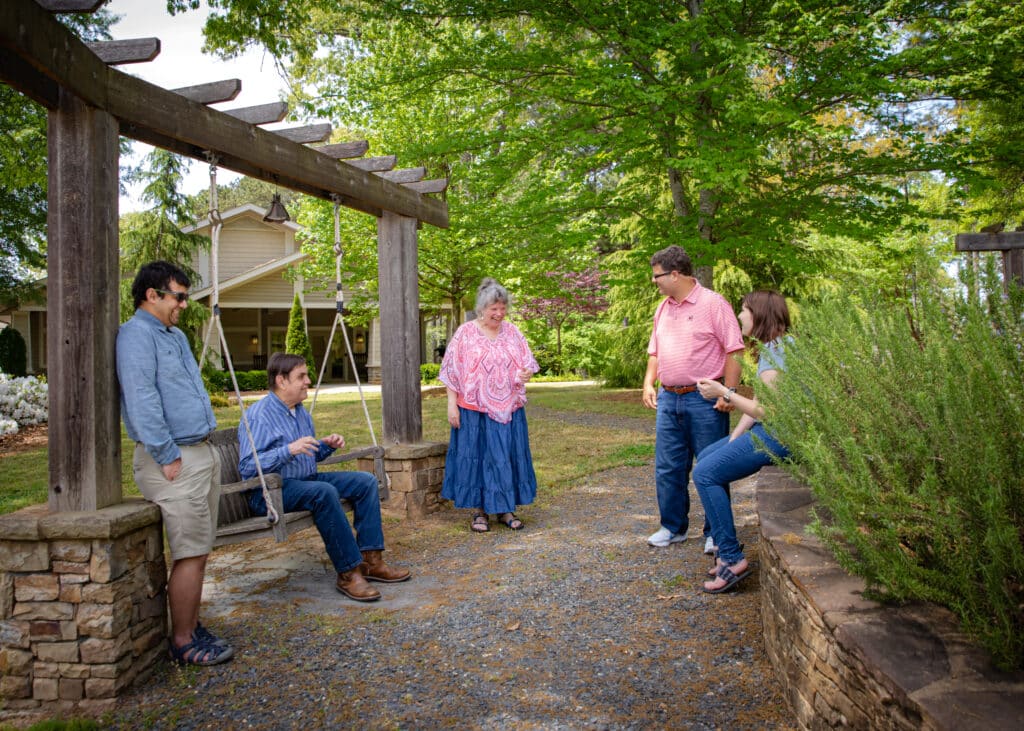
The staff had to pivot and find something to take the place of Jazzy.
“Our chief development and marketing officer had done golf tournaments [for a] previous employer and felt like we could do one and that it would be successful,” said Pomeranz.
To make it a little different, the tournament honored a long-time board member. The tournament was very successful, so the tradition continued. This year, however, Pomeranz is the one being honored.
“I was out on a brief medical leave when there was a board meeting; first board meeting I missed in 19 years,” he said. “They voted to make me the honoree of this year’s tournament to celebrate and honor my 20 years here at Annandale Village.”
Sponsorships are pouring in with congratulatory praise for Pomeranz.
“Some of these folks I’ve known for 20 years,” he said. “Their sister or brother has been in our care that long or maybe even a parent has had their child in our care.”
Annandale’s fourth Annual Golf Tournament is on May 6 at The Country Club of the South. Registration is open for foursomes. More information can be found at annandale.org/event/golf.
What folks have to say about Annandale Village:
- “Congratulations on 20 years!! I am so proud of all you have accomplished.” — Ina Enoch
- “Congratulations! Please give us 20 more!” — Jody Hoffman
- “Have a great game!!! Hope the weather is great!” — Denise Fitzpatrick
- “Thank you for all you do, Adam.” — Maureen Doran
- “In memory of Eric Pomeranz”— Felice Catalano
- “Wow! 20 years! Amazing achievement!”— Honey Strauss
- “Congrats on 20 years of devoted service!!”— Seena Axel
Related
Arlinda Smith Broady is part of the Boomerang Generation of Blacks that moved back to the South after their ancestors moved North. With approximately three decades of journalism experience (she doesn't look it), she's worked in tiny, minority-based newsrooms to major metropolitans. At every endeavor she brings professionalism, passion, pluck, and the desire to spread the news to the people.

Community
PTC Arts Inc. Furthers Mission to Provide Accessible Art
Published
24 hours agoon
October 23, 2024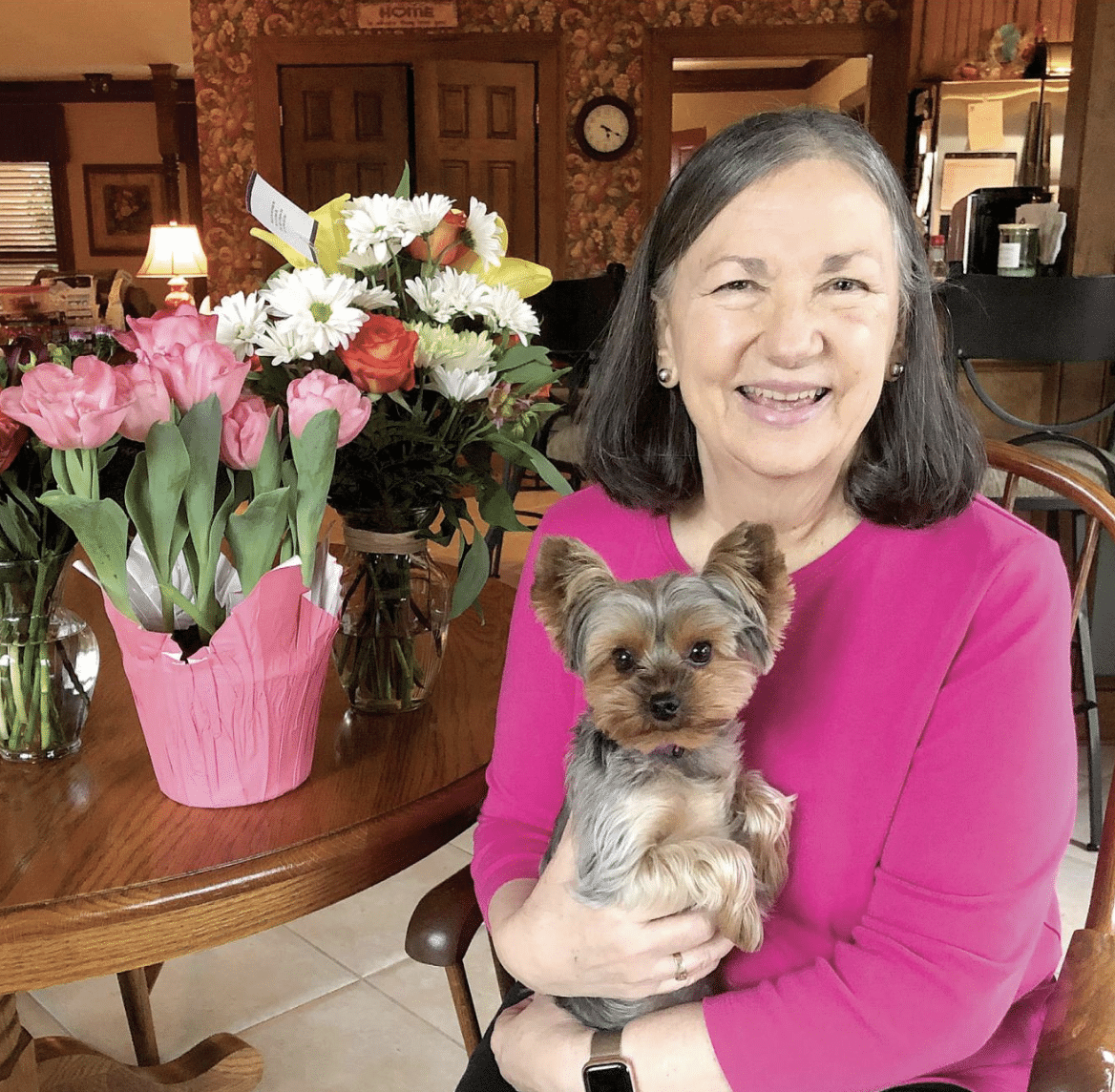
Not long after the incorporation of Peachtree Corners in 2012, city leaders envisioned an arts council that would ensure local arts and culture were given necessary attention. The Peachtree Corners Arts Council, now a 501(c)(3) nonprofit, was established in 2016 to bring that vision to life by creating an Arts & Culture Master Plan and Public Art Initiative program for the city.
The council facilitates public art projects, such as a soon-to-be-completed mural on Peachtree Corners Circle by artist Jonathan Bidwell. With another major endeavor, the independently funded Debbie Mason Memorial Garden, also nearing completion, Peachtree Corners Magazine caught up with the organization — now called Peachtree Corners Arts Inc. (PTC Arts) — to learn more about the projects as well as the future of arts and culture in our city.
Debbie Mason Memorial Garden
The Debbie Mason Memorial Garden is an aesthetic and contemplative garden space nestled in an area of the Peachtree Corners Botanical Garden near Town Center. A group of Peachtree Corners residents, with a shared love for the city’s first first lady and an appreciation for all that she has done for the city, formed the Debbie Mason Memorial Committee (DMMC) to raise funds to build the oasis that will delight with flowering color each season.

The goal of the DMMC is to preserve Mason’s memory by transforming a space that will offer Peachtree Corners residents a quiet place to reflect, connect and rejuvenate among vibrant colored seasonal plantings and mosaic tiled artwork, according to the PTC Arts website.
Although the Debbie Mason Memorial Garden falls under the umbrella of PTC Arts Inc., it had its own committee in charge of design and fundraising goals.
“When they started getting going, because they were creating an artistic kind of installation in the city and were going to raise the funds for it, they worked with our council for ideas and input on the plan that they ultimately came up with,” said Marcia Catterall, a member of PTC Arts. “They really ran independently with that. Primarily, they used us as the nonprofit vehicle to raise the funds.”
Independent of PTC Arts, DMMC created all of its own publicity and had a committee tasked with handling all of the fundraising.
Building a master plan
Although the objective of PTC Arts Inc. is simple, the execution can be complicated.
“We had our hands in numerous things,” said Catterall. “We’ve created the city’s arts and culture master plan. We created a public art initiative. Our goal was to think about all of the ways that arts and cultural activities could impact the city and then to help facilitate the creation and the installation of arts and culture in the city.”
The initiative, along with the master plan, took up the first several years of the council’s efforts. The master plan was formalized and officially adopted in 2018.

According to city records, “The resolution requires developers to meet with the Peachtree Corners Arts Council to discuss possibilities for public art on their property. Developers would also be asked to voluntarily set aside one percent of their project costs for public art, either by including public art on their site or contributing money to a public art fund administered by the city.”
“This Public Art Initiative and Vision Map is intended to help city officials, developers and the community at large visualize and implement the city’s public art future. It outlines a vision for public art, offers an inventory of opportunities for public art throughout the city and provides background on the types of projects that should be encouraged and prioritized,” the records continued.

Early efforts of the council included designing activities for the Town Green and facilitating the use of public spaces for a variety of arts and cultural activities.
“One of the things that we helped with initially was designing some of the activities and talking about how to host activities on the Town Green,” said Catterall. “Now that’s all handled separately by the city, but we were sort of the sounding board and created a lot of the ideas and the thoughts about how Town Green was to be used.”
The mural project and what’s ahead
The first big art installation project initiated from beginning to end by the council is a mural on the retaining wall at Peachtree Corners Circle.
“That’s going to be our first big project that we’ve started — soup to nuts — and have run with completely on our own,” said Catterall.
Jonathan Bidwell, a well-known artist out of Asheville, North Carolina is creating the mural, having designed several others in the past.

“He designed, for example, the playful foxes on the Social Fox Brewing Company in downtown Norcross,” she said. “He’ll be covering the big, long retaining wall that will border part of the Botanical Garden Walk around the Town Center area. And it will actually be near the Debbie Mason Memorial Garden.”
Funding for the mural project was covered partly through business donations.
“Part of our arts and culture master plan is to ask businesses, when they either develop or open up a new business, to donate 1% of their project value towards public art on their property or to give that to us,” Catterall said. “So, this is being funded mostly through the donation from QuickTrip’s new development.”
Since the company didn’t have a particular art installation in mind for its property, it allowed the money to go toward an effort elsewhere in the city.
The mural’s background colors were scheduled to be painted by the end of September with the remaining details to be completed by late October, in time for the ribbon cutting for the Debbie Mason Garden. That event is set for 11 a.m. on October 26.
For more information about Peachtree Corners Arts Inc., the mural or the Debbie Mason Memorial Garden, visit ptcarts.org.
You can read this article in the October/November issue of Peachtree Corners Magazine.
Related
Community
GCPL Accepting Applications for Next New Start Entrepreneurship Incubator
Published
5 days agoon
October 19, 2024
The Gwinnett County Public Library is now accepting applications for its next New Start Entrepreneurship Incubator Program (NSEI).
NSEI provides business education for formerly incarcerated individuals through in-person classes, online coursework and a robust network of mentors and community partners. NSEI is specifically geared towards the reentry population, which, in Georgia, is disproportionately minority populations and people of color.
This six-month course is designed to help community members who have served time in jail or prison create and sustain their own businesses.
“Formerly incarcerated individuals are an overlooked population of aspiring entrepreneurs, often lacking the means, access and support to launch a small business successfully,” said Charles Pace, executive director of the Gwinnett County Public Library.

About the program
NSEI originated as a grant project in 2021, funded by Google in partnership with the American Library Association.
Coordinated by a team of five library staff members, NSEI includes cohorts of 15 to 20 students who attend monthly presentations by local business experts on topics such as finance, marketing, licensing and writing a business plan. Following each meeting, participants complete assigned online coursework and receive one-on-one support from experienced small business mentors. The library provides free laptops and Wi-Fi service to those who need them.
The program’s culmination occurs at Launchpad, where the aspiring entrepreneurs pitch their businesses to community business leaders.
As of this year, the program has graduated 35 entrepreneurs in four cohorts. And the Gwinnett County Public Library Foundation has awarded $8,000 in start-up funding through the Launchpad event.
For more information, visit gwinnettpl.org/adults/new-start-entrepreneurship-incubator.
Related
Community
Gwinnett County Public Library Receives Innovation Award
Published
2 weeks agoon
October 7, 2024
The library system was honored with the Urban Libraries Council’s 2024 Innovation Award in Workforce and Economic Development
The Urban Libraries Council (ULC), North America’s leading nonprofit for urban libraries, has named Gwinnett County Public Library a Top Innovator for 2024. This recognition is in honor of the library’s New Start Entrepreneurial Incubator (NSEI), which offers business training and mentorship to formerly incarcerated community members.
Originally funded by Google through a grant from the American Library Association (ALA), the six-month program helps participants build the knowledge and skills necessary to start their own businesses.
“I’ve seen the life of each person who goes through this program change profoundly and significantly,” said Charles Pace, executive director of Gwinnett County Public Library. “We believe that people deserve a second chance. The New Start program gives them the tools, knowledge and support they need to become entrepreneurs and start their own businesses.”
ULC’s Innovations Initiative is a yearly showcase of exemplary projects from its more than 180 member libraries across the U.S. and Canada. It seeks to highlight how the library’s role as an essential public institution is evolving to meet the changing needs of our urban communities. From initiatives that promote civic engagement and intellectual freedom to projects that enhance digital connectivity and economic mobility, libraries are at the forefront of addressing today’s challenges.
Top innovators and honorable mentions
A distinguished panel of judges selected Gwinnett County Public Library as a Top Innovator. The project won in the Workforce and Economic Development category for its originality, measurable outcome and the potential for other libraries to replicate and implement this successful initiative. More than 230 library projects in six categories were submitted by ULC members from across the U.S. and Canada to be considered for the top awards.
Six public libraries received the Top Innovator designation, and six libraries received an honorable mention in recognition of their work. There is one top innovator and one honorable mention for each award category.
| AWARD CATEGORY | TOP INNOVATORS | HONORABLE MENTIONS |
| Advocacy and Awareness | San Francisco Public Library (CA) | Carnegie Library of Pittsburgh (PA) |
| Education: Children and Adults | Virginia Beach Public Library (VA) | New York Public Library (NY) |
| Equity and Inclusion | Miami-Dade Public Library System (FL) | Broward County Library (FL) |
| Health and Wellness | Denver Public Library (CO) | San Mateo County Libraries (CA) |
| Library Operations and Management | Toronto Public Library (ON) | Pioneer Library System (OK) |
| Workforce and Economic Development | Gwinnett County Public Library (GA) | Memphis Public Libraries (TN) |
“This year’s Innovations Initiative honorees exemplify the evolving role of libraries as dynamic public institutions that are integral to the fabric of our urban communities,” said ULC President and CEO Brooks Rainwater. “The innovative projects highlighted this year demonstrate the power of libraries to not only adapt but to actively shape the future of our cities, ensuring that all community members have the resources and opportunities they need to thrive.”
Information about the winning project from Gwinnett County Public Library and that of other honorees is available on the ULC website at www.urbanlibraries.org/innovations.
About Gwinnett County Public Library
Gwinnett County Public Library is a free provider of education and information. Located in
metro Atlanta, the Library has 15 branches that offer free access to computers and Wi-Fi, classes, materials and programming for people of all ages.
For more information about Gwinnett County Public Library programs and services, visit www.gwinnettlibrary.org.
Related
Read the Digital Edition
Subscribe
Keep Up With Peachtree Corners News
Join our mailing list to receive the latest news and updates from our team.
You have Successfully Subscribed!

TransPak Acquires Reid Packaging to Expand East Coast Presence

Peachtree Corners City Leaders Engage Residents on Land Use Development

The NOW Massage Opens Peachtree Corners Boutique at The Forum

GCPL Accepting Applications for Next New Start Entrepreneurship Incubator

Ruwa Romman’s Re-Election Bid: Addressing Housing, Taxes and Transportation in Gwinnett [Podcast]

Councilmember Sadd to Host Town Hall Meeting on October 29

PTC Arts Inc. Furthers Mission to Provide Accessible Art

From Corporate to Sci-Fi Author: Jill Tew Discusses ‘The Dividing Sky’ [Podcast]

From Corporate to Sci-Fi Author: Jill Tew Discusses ‘The Dividing Sky’ [Podcast]

PTC Arts Inc. Furthers Mission to Provide Accessible Art

Councilmember Sadd to Host Town Hall Meeting on October 29

Ruwa Romman’s Re-Election Bid: Addressing Housing, Taxes and Transportation in Gwinnett [Podcast]

GCPL Accepting Applications for Next New Start Entrepreneurship Incubator

TransPak Acquires Reid Packaging to Expand East Coast Presence

The NOW Massage Opens Peachtree Corners Boutique at The Forum

Peachtree Corners City Leaders Engage Residents on Land Use Development

Light up the Corners [Video]

Capitalist Sage: Business Leadership in Your Community [Podcast]

Cliff Bramble: A Culinary Adventure through Italy

Top 10 Brunch Places in Gwinnett County

A Hunger for Hospitality

THE CORNERS EPISODE 3 – BLAXICAN PART 1

Top 10 Indoor Things To Do This Winter

The ED Hour: What it takes to Remove Barriers from Education

Peachtree Corners Life
Topics and Categories
Trending
-
Business1 week ago
TransPak Acquires Reid Packaging to Expand East Coast Presence
-
Health & Wellness1 week ago
The NOW Massage Opens Peachtree Corners Boutique at The Forum
-
Community5 days ago
GCPL Accepting Applications for Next New Start Entrepreneurship Incubator
-
Peachtree Corners Life4 days ago
Ruwa Romman’s Re-Election Bid: Addressing Housing, Taxes and Transportation in Gwinnett [Podcast]








